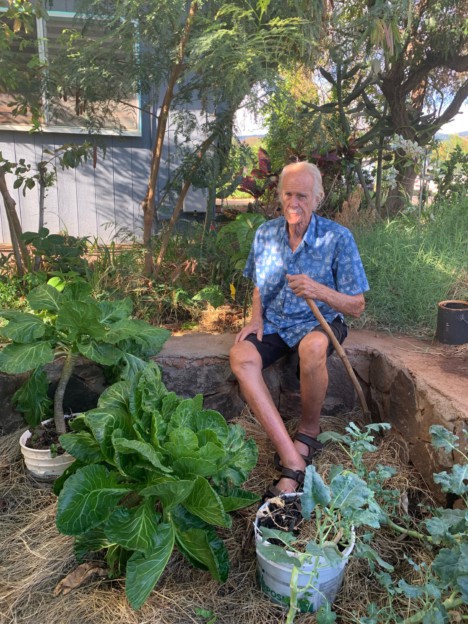Joe Kennedy Marks a Half-Century of Farming on Molokai
Joe Kennedy won’t give up. He’s been farming on Molokai for 55 years and despite heart trouble and a fractured pelvis, the 83-year-old is determined to keep producing food and to share his wealth of knowledge.
“I had a charmed childhood,” said Kennedy, who grew up in Missouri, where the family had a farm and loved gardening and nature. Although he earned a college degree in teaching and art, what he really wanted was to farm. While teaching in Alaska, his supervisor recommended he try Hawaii.
“Oahu was too commercialized,” said Kennedy, “but when I came to Molokai in 1969, I took one look at the land and people and knew I was going to stay. Since then, I have lived on the East End, Kawela, Kalae, Hoolehua, and now Ranch Camp. I’ve had gardens in all these places, experiencing the different kinds of weather and wildlife. I met a lot of people that way and still have friends in each place.”
Kennedy’s largest farming venture was on a 25-acre plot in the Ag Park near Kumu farms. He grew bananas and at one point was shipping up to 5,000 pounds a week to Honolulu.
“Still, I had to work as a house painter to support my farming habit,” said Kennedy with a smile. “I just had one worker to help me, but we stuck it out.”
“In the late 1980s, I realized that permaculture was the answer to the world’s problems. The idea behind it is to produce food with information and inputs from nature: you look at nature and copy it.”
Instead of monocultures of single crops, permaculture farmers combine perennial crops, including fruit and nut trees, with annuals and sometimes small livestock.
“I became much more diversified, growing all kinds of tropical fruits, with some vegetables and herbs. Once I understood it,” said Kennedy, “permaculture was a no-brainer. I found that all the fertilizers and pesticides, all these killer chemicals are not necessary. At first, chemical fertilizers make it easy, but it’s not good for the soil in the long run. The crops are weakened and begin to attract pests, so you have to keep using more and more inputs. Instead, I try to enhance the functions of nature, encouraging a diversity of insects, birds, and reptiles.”
“Simple things, like having water in your garden for a birdbath will encourage birds, and they’ll keep insect pests under control. Free of charge.”
Spend any time with Joe Kennedy and the subject will soon turn to mulch.
“What I concentrate on is mulch. A thick layer of mulch — leaves, grass clippings, twigs, branches — should cover the ground. It cuts down on weeds and conserves moisture, but it also breaks down and enriches the soil, creating conditions that encourage healthy soil microorganisms. When the soil is healthy, the plants will be too, and then they are more resistant to pests and disease.”
“Cardboard is another good input,” explained Kennedy. “If it is used right, it controls grass and weeds and retains moisture. The stores in town all know me and set aside their cardboard.”
Kennedy recommends growing “mulch trees” like moringa, kukui, and monkey pod. They can be constantly pruned to increase the supply of mulch, which is especially beneficial in dry areas to conserve moisture.
“I also recommend coppicing,” said Kennedy. Instead of letting a tree, such as a mango, grow to its full height, it can be heavily pruned to encourage it to branch out and become more productive. It is also easier to pick the fruit.
On Wednesday, June 5 at 5 p.m., Joe Kennedy gave a talk on his approach to farming at the Molokai Public Library. Coincidentally, June 5 is UN World Environment Day, and the theme this year seems tailor-made for Joe: ‘Land restoration, desertification and drought resilience.’ This year’s slogan is “Our Land, Our Future. We are #GenerationRestoration.”












Don't have a Molokai Dispatch ID?
Sign up is easy. Sign up now
You must login to post a comment.
Lost Password